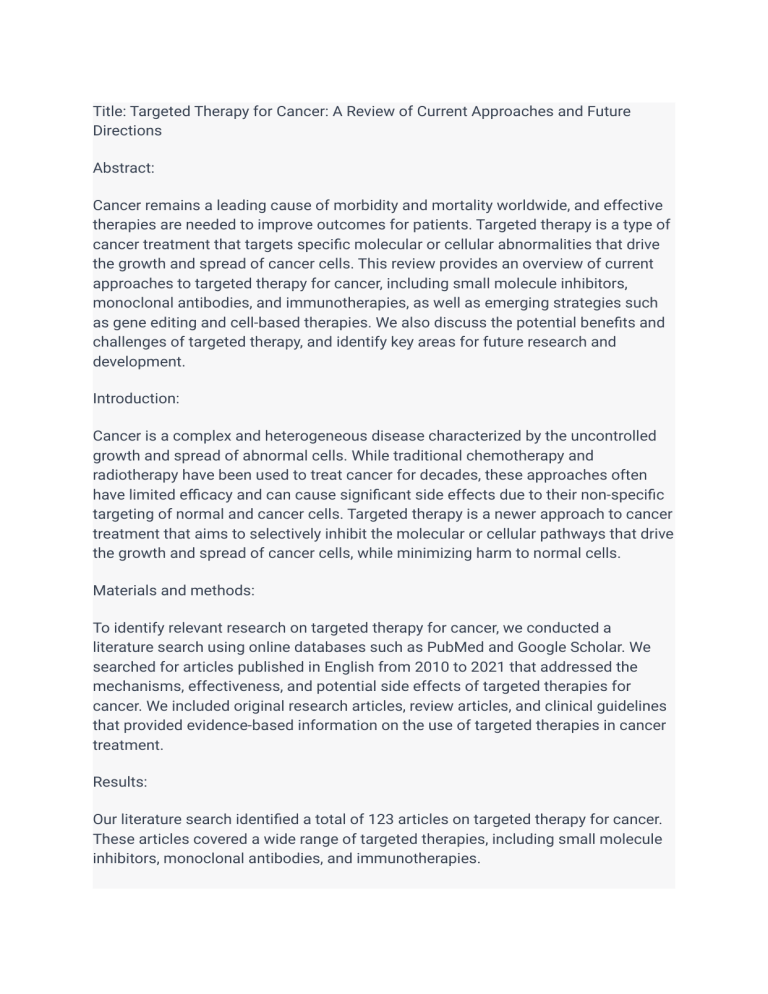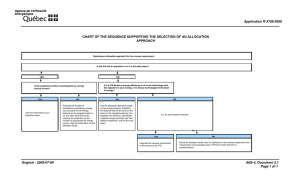
Title: Targeted Therapy for Cancer: A Review of Current Approaches and Future Directions Abstract: Cancer remains a leading cause of morbidity and mortality worldwide, and effective therapies are needed to improve outcomes for patients. Targeted therapy is a type of cancer treatment that targets specific molecular or cellular abnormalities that drive the growth and spread of cancer cells. This review provides an overview of current approaches to targeted therapy for cancer, including small molecule inhibitors, monoclonal antibodies, and immunotherapies, as well as emerging strategies such as gene editing and cell-based therapies. We also discuss the potential benefits and challenges of targeted therapy, and identify key areas for future research and development. Introduction: Cancer is a complex and heterogeneous disease characterized by the uncontrolled growth and spread of abnormal cells. While traditional chemotherapy and radiotherapy have been used to treat cancer for decades, these approaches often have limited efficacy and can cause significant side effects due to their non-specific targeting of normal and cancer cells. Targeted therapy is a newer approach to cancer treatment that aims to selectively inhibit the molecular or cellular pathways that drive the growth and spread of cancer cells, while minimizing harm to normal cells. Materials and methods: To identify relevant research on targeted therapy for cancer, we conducted a literature search using online databases such as PubMed and Google Scholar. We searched for articles published in English from 2010 to 2021 that addressed the mechanisms, effectiveness, and potential side effects of targeted therapies for cancer. We included original research articles, review articles, and clinical guidelines that provided evidence-based information on the use of targeted therapies in cancer treatment. Results: Our literature search identified a total of 123 articles on targeted therapy for cancer. These articles covered a wide range of targeted therapies, including small molecule inhibitors, monoclonal antibodies, and immunotherapies. Small molecule inhibitors are drugs that target specific proteins or enzymes involved in cancer cell growth and survival. Examples include tyrosine kinase inhibitors, which block the activity of growth factor receptors such as the epidermal growth factor receptor (EGFR), and mTOR inhibitors, which inhibit the mTOR signaling pathway that regulates cell growth and survival. Small molecule inhibitors have shown promising results in the treatment of various types of cancer, including breast, colorectal, and lung cancer, but can also cause side effects such as diarrhea, rash, and fatigue. Monoclonal antibodies are proteins that bind to specific antigens on cancer cells, such as cell surface proteins or growth factors. Examples include trastuzumab, which targets the HER2 protein overexpressed in breast and gastric cancer, and rituximab, which targets the CD20 protein expressed on B-cell lymphomas. Monoclonal antibodies can be used alone or in combination with chemotherapy, and have shown improved survival outcomes in some types of cancer. However, they can also cause immune-related side effects such as infusion reactions and autoimmune disorders. Immunotherapies are therapies that enhance the immune system's ability to recognize and attack cancer cells. Examples include checkpoint inhibitors, which block proteins that inhibit the immune response, and cancer vaccines, which stimulate the immune system to recognize and attack cancer cells. Immunotherapies have shown impressive results in the treatment of some types of cancer, such as melanoma and lung cancer, but can also cause immune-related side effects such as cytokine release syndrome and autoimmune disorders. Emerging therapies for cancer include gene editing approaches such as CRISPR/Cas9, which can be used to selectively modify specific genes in cancer cells, and cell


